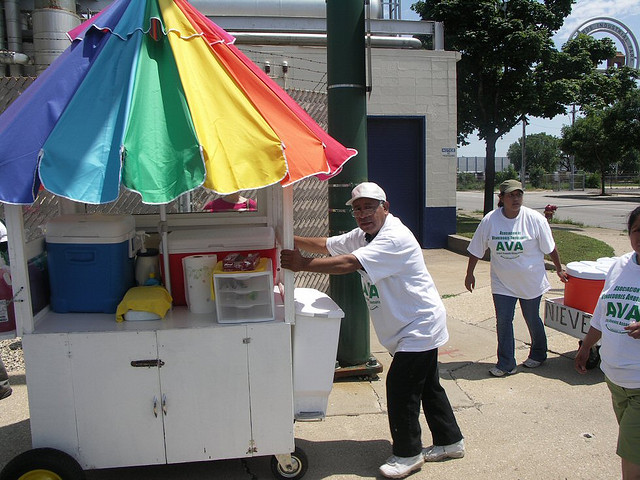Can The City Be More Friendly To Small Diverse Food Businesses?
By Melissa McEwen in Food on Aug 26, 2014 3:40PM

Street vendor from The Assocation of Street Vendors at a 2009 protest against vendor harassment (Tim Bell/Creative Commons)
Over the past decade, Chicago has grown into one of our country’s greatest food destinations. Our restaurant scene is top notch, but there are holes in our food scene – quiet street corners that would be filled with delicious food in many other cities. That’s because the types of businesses that would fill these niches are either banned or subject to onerous and unpredictable regulation.
While some politicians feign concern for health or parking, the fact it’s more about political concerns was highlighted by the recent city-supported opening of e.a.t. Spots, food kiosks operating in old newspaper stands. This irked the operators of small food carts, many of whom ply their trade, hidden in residential blocks, despite it being illegal. These entrepreneurs, many of them immigrants, live in fear of having their small businesses ticketed, while these new e.a.t. Spots ply gluten-free wraps and kale salads with the full backing of the city.
But their concern that foods that appeal to the trendy are getting special treatment isn’t fully backed by the evidence. Other food carts that have been unable to operate sell the kind of things that hipsters love, like the artisan coffee and tea that Sara Travis wanted to sell from her Brew Hub cart. Frustrated with Chicago’s regulations, she moved to Austin, Texas, a place that has attracted several other small food entrepreneurs fleeing the hostile regime of Chicago, like Fred Noinaj of the Hey-Ha Truck. If the concerns of Chicago politicians were true, Austin would have long ago shuttered all its brick and mortar restaurants and the people there would be wrecked by epidemics of food poisoning. But Austin’s food scene is thriving on all levels – from large restaurants to small carts.
Can Chicago’s food scene have the same diversity? It depends on if thee city is willing to overcome its political inertia and tendency to engage in protectionism of restaurants they feel might lose business, because consumers would enjoy exercising a choice to eat at a delicious food cart instead of having a mediocre sandwich. The reality is these non-restaurant food businesses are a valuable part of the food scene and often end up becoming restaurants once they’ve had a chance to grow.
If anything, hopefully e.a.t. spots will show that these non-restaurant food businesses can thrive and deserve a chance to do do. Ald. Roberto Maldonado introduced an ordinance to legalize food carts crafted by the The Street Vendors Justice Coalition in May. It’s sat in the City Council since then. In the meantime politicians have continued their absurd crusade to make business difficult for food trucks. Now is the best time to end Chicago’s hostile environment towards these businesses and allow all types of food businesses to thrive.